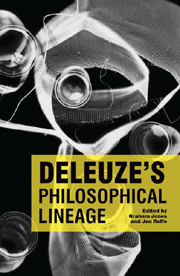Book contents
- Frontmatter
- Contents
- Acknowledgements
- List of Abbreviations
- Introduction: Into the Labyrinth
- 1 Plato
- 2 John Duns Scotus
- 3 G. W. F. Leibniz
- 4 David Hume
- 5 Immanuel Kant
- 6 Solomon Maimon
- 7 G. W. F. Hegel
- 8 Karl Marx
- 9 Hoëne Wronski and Francis Warrain
- 10 Bernhard Riemann
- 11 Gabriel Tarde
- 12 Sigmund Freud
- 13 Henri Bergson
- 14 Edmund Husserl
- 15 A. N. Whitehead
- 16 Raymond Ruyer
- 17 Martin Heidegger
- 18 Pierre Klossowski
- 19 Albert Lautman
- 20 Gilbert Simondon
- Bibliography
- Notes on Contributors
- Index
15 - A. N. Whitehead
Published online by Cambridge University Press: 12 September 2012
- Frontmatter
- Contents
- Acknowledgements
- List of Abbreviations
- Introduction: Into the Labyrinth
- 1 Plato
- 2 John Duns Scotus
- 3 G. W. F. Leibniz
- 4 David Hume
- 5 Immanuel Kant
- 6 Solomon Maimon
- 7 G. W. F. Hegel
- 8 Karl Marx
- 9 Hoëne Wronski and Francis Warrain
- 10 Bernhard Riemann
- 11 Gabriel Tarde
- 12 Sigmund Freud
- 13 Henri Bergson
- 14 Edmund Husserl
- 15 A. N. Whitehead
- 16 Raymond Ruyer
- 17 Martin Heidegger
- 18 Pierre Klossowski
- 19 Albert Lautman
- 20 Gilbert Simondon
- Bibliography
- Notes on Contributors
- Index
Summary
There is no ‘Deleuze's Whitehead’ in the same way as there is ‘Deleuze's Hume’ or ‘Deleuze's Nietzsche’. He neither wrote a major book on Whitehead, as he did for Spinoza or for Leibniz, nor did he refer to Whitehead regularly to allow a critical or sympathetic position to emerge. This does not mean there is no value or basis in reflecting on the Deleuze and Whitehead connection. On the contrary, I will give four reasons for returning to this link in terms of Deleuze's and Whitehead's philosophies and in terms of wider philosophical problems. The first reason is biographical and historical. Deleuze has roots in an early French reader of Whitehead through the work of his teacher and colleague Jean Wahl. These roots then extend through Deleuze's teaching to thinkers who worked alongside him or closely on his philosophy and now trace a novel Deleuzian lineage. I want to comment in detail on one of these philosophers, Isabelle Stengers, but I will also refer readers to others, such as Éric Alliez, Steven Shaviro and Jean-Claude Dumoncel. All have written at length on Deleuze and on Whitehead and have investigated rewarding overlaps and tensions. Their texts provide a rich and varied philosophical timeline running through Deleuze's study of Whitehead.
Second, Whitehead turns up infrequently and marginally in Deleuze's early and middle period work (roughly up to 1969 with the publication of Difference and Repetition and The Logic of Sense, then from 1969 to 1979 with the capitalism and schizophrenia works with Félix Guattari).
- Type
- Chapter
- Information
- Deleuze's Philosophical Lineage , pp. 282 - 299Publisher: Edinburgh University PressPrint publication year: 2009



